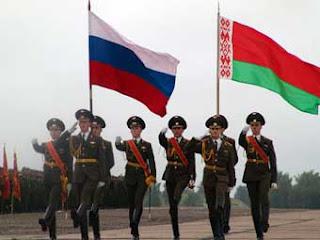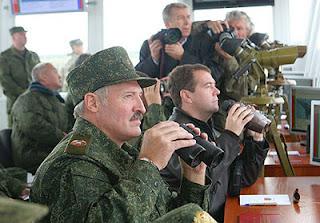 “Without Russia, Belarus is nothing”. With this title, the English web version of the Russian newspaper Pravda published this week an article on the economic situation in Belarus. With the Belarusian ruble highly devalued and an annual inflation rate above 100%, Minsk has been actually saved from bankruptcy by Russian subsidies on gas prices, loans and hard cash for the recent sale of the remaining 50% stake of Beltransgaz to Gazprom.
“Without Russia, Belarus is nothing”. With this title, the English web version of the Russian newspaper Pravda published this week an article on the economic situation in Belarus. With the Belarusian ruble highly devalued and an annual inflation rate above 100%, Minsk has been actually saved from bankruptcy by Russian subsidies on gas prices, loans and hard cash for the recent sale of the remaining 50% stake of Beltransgaz to Gazprom.
If it is undeniable the dependence of the Belarusian economy from Moscow, no less important is nevertheless the role of Belarus in contributing to Russia’s “geopolitical security” (geopoliticheskaya bezopasnost’). On April 2, 1996, the governments of the two former Soviet republics established the “Commonwealth of Belarus and Russia”, a supranational entity whose name was later changed to “Union State” with the intention to eventually reunite the two countries under a federation. A Treaty on the Creation of a Union State of Russia and Belarus was signed on December 8, 1999 and came into effect on January 26, 2000, when the National Assembly of Belarus, following the ratification by the Russian State Duma, ratified it in turn. Nevertheless, enthusiasm for the project had already decreased in both Moscow and Minsk.
When Russia’s president was still Boris Yeltsin, there had been discussions about the possibility of creating two top executive positions in the Union leadership, that of president and vice president. Accordingly, if Lukashenko became number two, as a young, energetic vice of an old, sick Yeltsin, he would have had good chances of turning himself into the leader of a new powerful state in a short period of time. Hence the Batka’s support for the union with Russia. Once the former KGB agent Vladimir Putin took the reins of the Kremlin, Lukashenko realized that there were no longer chances to play the card of integration for increasing his personal power and he started then to emphasize his commitment to Belarus’ independence. However, relations between Minsk and Moscow, tough with ups and downs, has remained close over the last decade.
PRESIDENTS LUKASHENKO AND MEDVEDEV DURING THE ZAPAD 2009 MILITARY EXERCISE
 The political fusion of Russia and Belarus appears now as a wrecked perspective. Nevertheless, in the military field a notable integration has been actually achieved, as the two countries have a unified air defense system and several joint military exercises have taken place. Russia’s military doctrine, approved in February 2010, names NATO expansion as the main external threat. Similar to NATO’s article 5, it “considers an armed attack on the state-participant in the Union State, as well as all other actions involving the use of military force against it, as an act of aggression against the Union State”, authorizing Moscow to “take measures in response”.
The political fusion of Russia and Belarus appears now as a wrecked perspective. Nevertheless, in the military field a notable integration has been actually achieved, as the two countries have a unified air defense system and several joint military exercises have taken place. Russia’s military doctrine, approved in February 2010, names NATO expansion as the main external threat. Similar to NATO’s article 5, it “considers an armed attack on the state-participant in the Union State, as well as all other actions involving the use of military force against it, as an act of aggression against the Union State”, authorizing Moscow to “take measures in response”. The doctrine provides that the Russian Federation’s main priorities for its military cooperation with the Republic of Belarus are coordination of efforts in developing the national armed forces and using military infrastructure, and developing and coordinating measures toward maintaining the defense capabilities of the Union State in accordance with the Military Doctrine of the Union State. According to the text approved, Russia can also use nuclear weapons in response to the use of any types of weapons of mass destruction against itself or its allies.
The importance of Belarus for Russia lies on the strategic location of the Belarusian territory, wedged between Latvia, Lithuania and Poland, all three countries members of NATO, and Ukraine, the main battlefield between Moscow and the Alliance. Furthermore, Minsk’s membership to the Union State allows the Kremlin to mitigate the isolation of Kaliningrad from the rest of Russia. For the same reasons, any integration of Belarus into the structures of Western Europe would have deleterious consequences for Russia’s perceived national security. This is why, at least for the near future, Moscow is likely to keep its economical and political support to its Union State partner, in fact confirming what Lukashenko said when, commenting on the close military cooperation between the two countries, he likened Belarus’ 10 million people as a human shield for Russia against the West, a service that the Belarusian leader said “was not free”.

